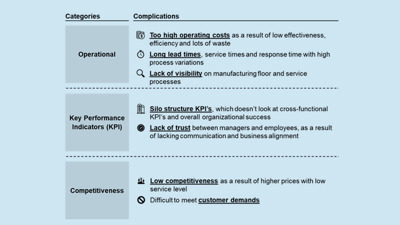Introduction
This article will highlight some of the reasons why companies should focus on optimizing their company processes. Many companies today, unfortunately experience that most of the focus is on their daily tasks and on firefighting culture instead of focusing on developing and delivering the best experience for their customers. The article identifies some of the complications that many companies face today, as a result of not having optimized their processes. The complications mentioned in this article are discovered through projects and industry experiences and are often drivers for removing customer focus.
Some of today's complications
Many companies today, lack an overall overview of their processes and respective flows. As well as just understanding their processes and how they interact with other parts of the organization. Which often can be seen in low efficiency and high process variations, with a lack of standards. These situations also often define silo structured companies that have difficulties in creating business alignment KPI’s and reaching high competitiveness. We have set up three main categories of complications that describe some of the problems above. The first category is Operational complications, which often can be seen in high operating costs, long lead times and lack of visibility. The next category is Key Performance Indicators (KPI), which often can be noticed through an organization with silo structured KPIs and trust issues as well as tensions between managers and employees. The last category is Competitiveness, as companies who don’t focus on their processes have a great chance of experiencing low competitiveness and difficulties in meeting customers demands.

If you experience or can relate to some of the above-mentioned complications, your organization will most likely handle resources inefficiently, generate waste and have long lead times, consequently culminating in high operating costs. These complications may also result in employees being too busy managing daily tasks, an absence of trust between managers and employees, insufficient communication between departments or even departments being subject to a silo mentality. Furthermore, it is seen that companies often are reluctant to share information between departments and have established department focused KPI’s, rather than organization KPI’s thus being unsupportive of company goals. This makes it impossible to align a business and utilize company processes in the most beneficial way. Lastly, the increased competition from a globalized and ever-changing market makes it vital for companies to focus on these complications.
Tips & Tricks
- Understand the operational performance by quantifying:
- Production costs
- Waste
- Lead times
- Create an overview of all department and organizational KPI's
- Make a visual representation of the department specific KPI's
- Understand how department KPI's connect or interfere with other department KPI's
- Identify customer needs through surveys, interviews or focus groups
Series of articles on process improvements
This is the second article in the series of nine
- Potential impact whe Changing Processes
- Why Companies Should Focus on Optimizing Company Processes
- Roadmap on Redesigning a Company’s Processes to Enhance Competitiveness
- Roadmap step 1: Identify and Understand Your Processes
- Roadmap step 2: Monitor your Processes
- Roadmap step 3: Identifying Waste and Variability in your Processes
- Roadmap step 4: Become Resilient to Sudden Changes
- Roadmap step 5: Simulate your New Process Design
- Roadmap step 6: Implementation and Continuous Improvement Process



